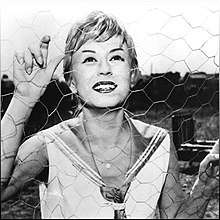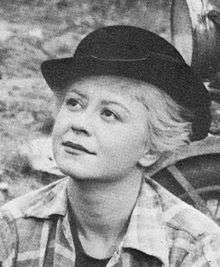Giulietta Masina
| Giulietta Masina | |
|---|---|
 Masina in Nights of Cabiria, 1957 | |
| Born |
Giulia Anna Masina 22 February 1921 San Giorgio di Piano, Italy |
| Died |
23 March 1994 (aged 73) Rome, Italy |
| Occupation | Actress |
| Years active | 1942–1991 |
| Spouse(s) | Federico Fellini (1943–1993; his death) |
Giulietta Masina (22 February 1921 – 23 March 1994) was an Italian film actress, best known for her performances of Gelsomina in La Strada (1954) and Cabiria in Nights of Cabiria (1957). Both films won Academy Awards for Best Foreign Language Film and were described by their director Federico Fellini as having been "inspired" by Masina's "humanity."[1] Italian cinema historian Peter Bondanella described Masina's work as "masterful" and "unforgettable,"[2] and Charlie Chaplin, with whose work Masina's is often compared,[3][4][5] called her "the actress who moved him most."[6]
Life
Masina was born Giulia Anna Masina, the oldest of four children, in San Giorgio di Piano, near Bologna. Her father was a violinist and her mother was a schoolteacher. When Masina was four, her uncle took her to meet the Italian playwright Luigi Pirandello, who was later to win the Nobel Prize in literature. A few years later, when this uncle passed away, his widow, Masina's aunt, asked Masina's parents if they would allow her to come to Rome to stay with her. Masina's parents agreed, in part because they believed that in Rome Masina would have more success in the arts, for which she was already demonstrating a unique talent.[7]
Masina attended an Ursuline Sisters school and took lessons in voice, piano, and dance. Her first experiences acting took place during World War II as part of the theater section of Rome's Gruppi Universitari Fascisti, a state-sponsored but university-student-led arts organization. She graduated with a degree in Literature from Sapienza University of Rome. Masina began to work as a voice actress on radio during the war, which earned her more money and attention than stage acting.
It was as a radio artist that Masina met Federico Fellini, a radio show screenwriter who would go on to become one of the most influential directors in film history.[8] They married in 1943, and a few months later Masina suffered a miscarriage after falling down a flight of stairs. In 1944, she became pregnant again; Pierfederico (nicknamed Federichino) was born on 22 March 1945. He died from encephalitis a month later,[9] and Masina and Fellini did not have another child.
Masina died from lung cancer on 23 March 1994 at age 73, five months after her husband's death on 31 October 1993. For her funeral, she requested that trumpeter Mauro Maur play "La Strada" by Nino Rota,[10] a poignant leitmotif from the film. She and Fellini are buried together at Rimini cemetery in a tomb marked by a prow-shaped monument, the work of sculptor Arnaldo Pomodoro.
Career

Working together with her husband, Masina made the transition to on-screen acting.[11] Half of her Italian films, the most successful ones, were either written or directed by her husband. Masina made her film debut in an uncredited role in Rossellini's Paisà (1946), credit for the script being given to Fellini. She received her first screen credit in Lattuada's Without Pity (1948), which was another adaptation by Fellini and played opposite John Kitzmiller.
In 1954, she starred with Anthony Quinn in Fellini's La Strada, playing the abused stooge of Quinn's travelling circus strongman. In 1957, she won the Best Actress Award at the Cannes Film Festival for her portrayal of the title role in Fellini's Nights of Cabiria. She played a prostitute who endures life's tragedies and disappointments with both innocence and resilience. In 1960, Masina's career was damaged by the critical and box office failure of The High Life. Subsequently, she became dedicated almost entirely to her personal life and marriage. Nonetheless, she again worked with Fellini in Juliet of the Spirits (1965), which earned both the New York Film Critics award (1965) and the Golden Globe award (1966) for Best Foreign Language Film.
In 1969, Masina did her first work in English in The Madwoman of Chaillot which starred Katharine Hepburn. After almost two decades, during which she worked sporadically only in television, Masina appeared in Fellini's Ginger and Fred (1986). She then rejected outside offers in order to attend to her husband's precarious health. Her last film was Jean-Louis Bertucelli's A Day to Remember (1991).
In the late 1960s, Masina hosted a popular radio show, Lettere aperte, in which she addressed correspondence from her listeners. The letters were eventually published in a book. From the 1970s on, she appeared on television. Two performances, in Eleonora (1973) and Camilla (1976), respectively, were particularly acclaimed.
Masina is often referred to favorably as Fellini's "muse," which is a term, however, that feminist scholars have argued can eclipse consideration of women's roles as thinkers and artists in their own right.[12] A recent critic has suggested that "perhaps the time has come for the field of Fellini studies to properly reassess [Masina's] creative role in the making of some of her husband's masterpieces."[13]
Awards
- Italian National Syndicate of Film Journalists: 4 Silver Ribbon awards.
- Best Actress: Nights of Cabiria (1957), Ginger and Fred (1986)
- Best Supporting Actress: Without Pity (1948), Variety Lights (1950)
- She was twice nominated for a BAFTA Film Award for Best Foreign Actress.
- David di Donatello: 2 David awards
- David di Donatello for Best Actress award, by Juliet of the Spirits (1965)
- Honorary award (1986).
- Cannes Film Festival Best actress award, by Nights of Cabiria (1957).
- San Sebastián film festival Best actress award, by Nights of Cabiria (1957).
Filmography
| Year | Title | Role | Notes |
|---|---|---|---|
| 1946 | Paisan | Young woman | (debut, uncredited) |
| 1948 | Without Pity | Marcella | |
| 1951 | Behind Closed Shutters | Pippo | |
| Variety Lights | Melina Amour | ||
| Seven Hours of Trouble | Figlia de Romolini | ||
| Position Wanted | Paola | ||
| Cameriera bella presenza offresi... | Ermelinda | ||
| 1952 | The Shameless Sex | Nadina | |
| The White Sheik | Cabiria | ||
| Europa '51 | Giulietta | ||
| 1953 | At the Edge of the City | Gina Ilari | |
| 1954 | La Strada | Gelsomina | |
| 100 Years of Love | The Neighbour at the Rear Window | ||
| Angels of Darkness | Rosita | ||
| 1955 | Il bidone | Iris | |
| 1957 | Nights of Cabiria | Maria Cabiria Ceccarelli | |
| 1958 | Fortunella | Nanda Diotallevi aka Fortunella | |
| 1959 | Nella città l'inferno | Lina | |
| ...and the Wild Wild Women | Erdme | ||
| 1960 | The High Life | Doris Putzke | |
| 1965 | Juliet of the Spirits | Giulietta Boldrini | |
| 1969 | The Madwoman of Chaillot | Gabrielle | |
| 1985 | The Feather Fairy | Perinbaba | |
| 1986 | Ginger and Fred | Amelia Bonetti "Ginger" | |
| 1991 | A Day to Remember | Bertille | Final Film Role |
Notes and references
- ↑ Fellini, Federico (1978). "My Experiences as a Director". In Bondanella, Peter. Federico Fellini: Essays in Criticism. New York: Oxford University Press. p. 7. ISBN 01950222734 Check
|isbn=value: length (help). - ↑ Bondanella, Peter (2009). A History of Italian Cinema. New York: Continuum. pp. 148, 151. ISBN 9780826417855.
- ↑ New York Times review of Nights of Cabiria
- ↑ reference at filmsdefrance.com
- ↑ reference at filmbug.com
- ↑ Davis, Melton S. (January 2, 1966). "First the Pasta, Then the Play". The New York Times.
- ↑ Kezich, Tullio (1991). Giulietta Masina. Bologna: Cappelli. p. 22.
- ↑ "Most Influential Directors in Film History and Their Masterpieces".
- ↑ Information on miscarriage and death from encephalitis cited in Tullio Kezich, Fellini: His Life and Work (New York: Faber, 2006), 74.
- ↑ gli amici ricordano Giulietta
- ↑ Entry at Allmovie.com website
- ↑ Allen, Jeffner; Young, Iris Marion (1989). The Thinking Muse. Bloomington: Indiana University Press. p. 1. ISBN 0253359805.
- ↑ Surliuga, Victoria (2016). "Co-Making Federico Fellini: Giulietta Masina's Achievement". Federico Fellini: Riprese, riletture, (re)visioni. Franco Cesati Editore. p. 131. ISBN 8876675523.
External links
| Wikimedia Commons has media related to Giulietta Masina. |
- Giulietta Masina on IMDb
- Giulietta Masina at AllMovie
- Giulietta Masina at the RAI
- Giulietta Masina at Find a Grave